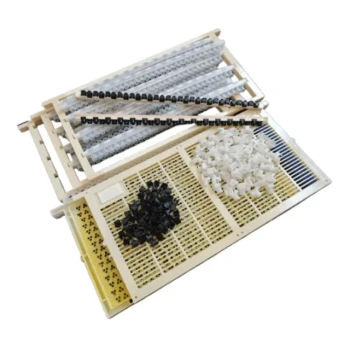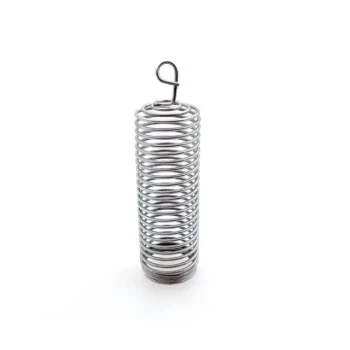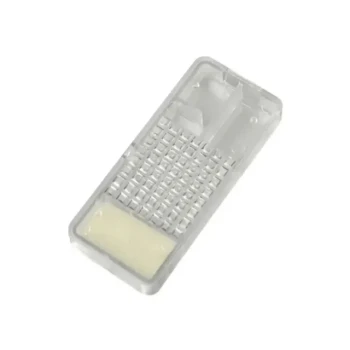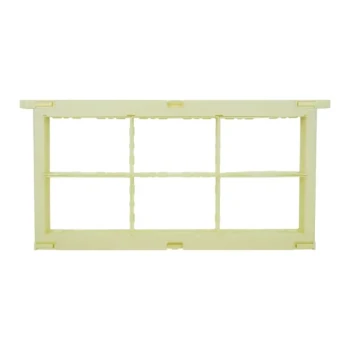The primary benefits of using small nucs for raising queens are superior resource efficiency and reduced competition within your apiary. Because they require fewer bees and less brood comb to establish, they allow you to produce more queens with fewer resources drawn from your production hives.
The core decision is a trade-off between scale and stability. Small nucs are a specialized, high-efficiency tool for producing the maximum number of mated queens, while larger nucs are more versatile and resilient.
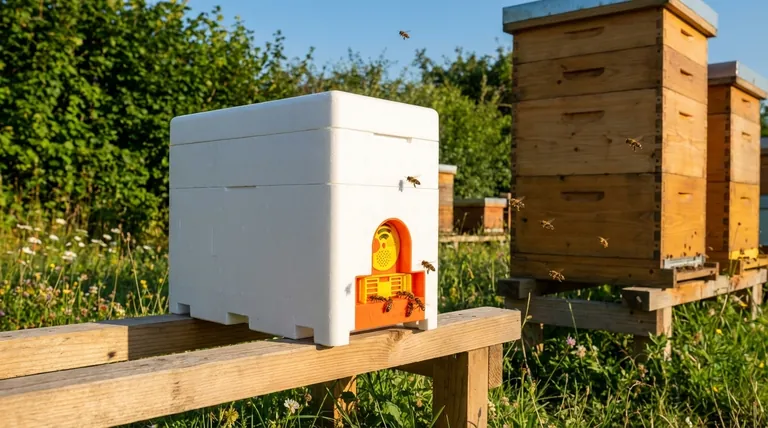
The Strategic Role of Nucleus Colonies
A nucleus colony, or "nuc," is a small, functional honey bee colony. While they serve many purposes in an apiary—from preventing swarms to strengthening weak hives—they are indispensable for queen rearing.
Every beekeeper, regardless of the size of their operation, can benefit from using nucs. They provide a controlled environment to manage one of the most critical aspects of beekeeping: ensuring you have healthy, well-mated queens ready when you need them.
Core Benefits of Small Mating Nucs
When the specific goal is mating a large number of queens, smaller nucs offer distinct advantages over their larger counterparts. The strategy is to invest the minimum resources necessary to get the job done.
Maximizing Resource Efficiency
A small mating nuc requires very few resources to start. Typically, just one frame of brood and the accompanying nurse bees are enough.
This efficiency is a significant advantage. It means your strong, honey-producing colonies are minimally impacted, freeing up frames of brood and bees to create more mating nucs or support the main hives.
Reducing Apiary Competition
In large beeyards with many colonies, foraging resources can become limited. Smaller nucs have a much smaller population and therefore a lower demand for nectar and pollen.
This reduction in competition can be crucial for the health of all colonies in the apiary, preventing resource stress during the queen mating process.
Streamlining Queen Management
A smaller box with fewer frames and bees makes finding and assessing the queen a much faster process. For a breeder managing dozens or hundreds of units, this time savings is a major operational benefit.
Understanding the Trade-offs
While efficient, small mating nucs are not a universal solution. Their specialized nature comes with clear limitations that must be considered.
The Versatility of Larger Nucs
A standard five-frame nuc is often more practical for general use. It is large enough to be a sustainable colony that can grow on its own.
These larger nucs can also accommodate standard equipment, like queen excluders or honey supers, making them far more versatile than a small mating nuc.
Environmental Vulnerability
The small population of a mating nuc makes it more vulnerable. It has less thermal mass to withstand sudden cold spells and fewer foragers to handle an unexpected nectar shortage. They require more careful monitoring than a larger, more robust nuc.
Making the Right Choice for Your Goal
The right equipment depends entirely on your specific objective. Understanding your primary goal will make the choice clear.
- If your primary focus is large-scale queen production: Small mating nucs are the superior tool, maximizing efficiency and output.
- If your primary focus is raising a few replacement queens and creating new, sustainable colonies: A larger, standard five-frame nuc is the more resilient and practical choice.
Ultimately, choosing the right nuc size is about aligning your equipment with your beekeeping strategy.
Summary Table:
| Benefit | Key Advantage |
|---|---|
| Resource Efficiency | Requires only 1 frame of brood & bees, minimizing impact on production hives. |
| Reduced Competition | Lower population eases demand for nectar/pollen, reducing apiary-wide stress. |
| Streamlined Management | Smaller size makes finding and assessing queens faster for large-scale operations. |
| Trade-off: Vulnerability | Less resilient to cold weather and nectar shortages; requires closer monitoring. |
Ready to optimize your queen-rearing operation?
At HONESTBEE, we specialize in supplying commercial apiaries and beekeeping equipment distributors with the wholesale supplies needed to implement efficient strategies like small nuc systems. Our products help you maximize queen production, manage resources effectively, and scale your operation with confidence.
Contact our team today to discuss your specific needs and discover how our equipment can benefit your business.
Visual Guide
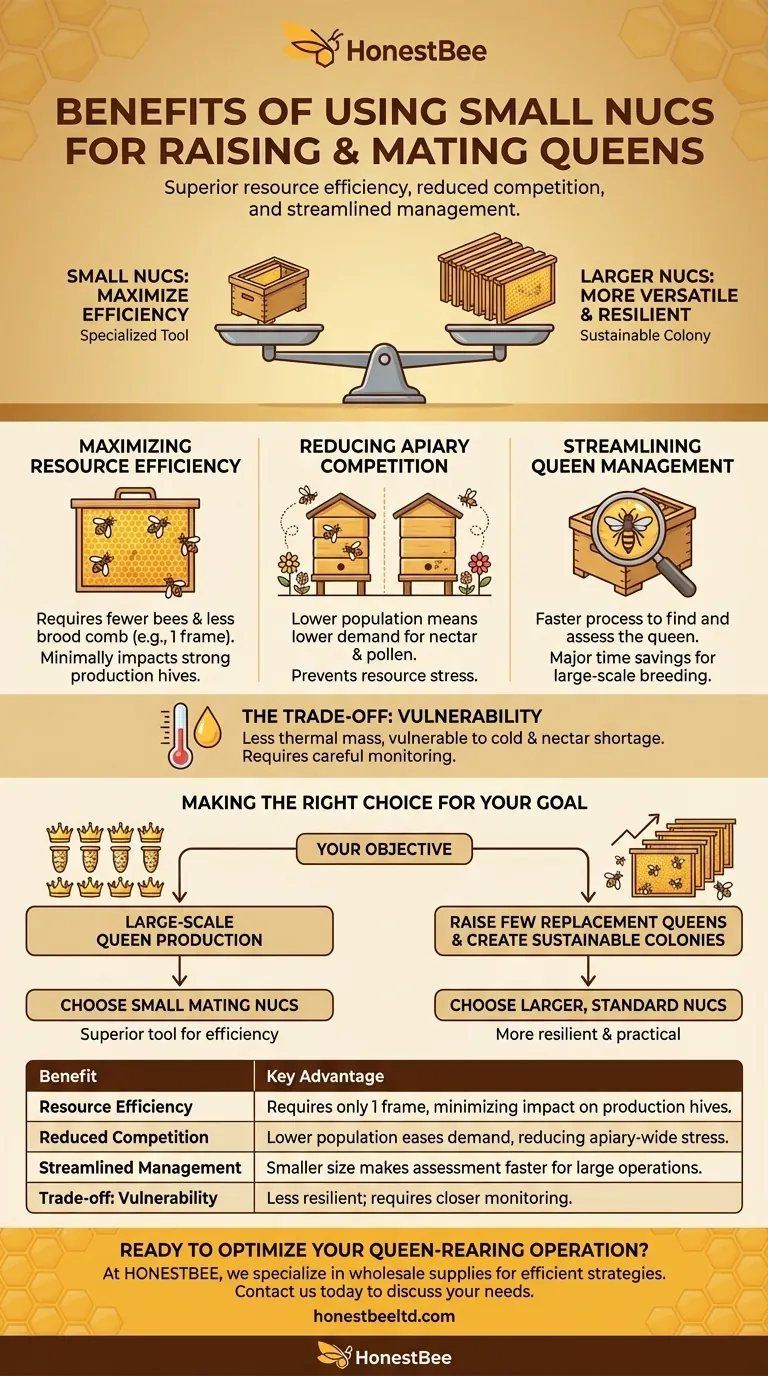
Related Products
- Portable Bee Mating Hive Boxes Mini Mating Nucs 8 Frames for Queen Rearing
- Styrofoam Mini Mating Nuc Box with Frames Feeder Styrofoam Bee Hives 3 Frame Nuc Box
- Twin Queen Styrofoam Honey Bee Nucs Mating and Breeding Box
- Automatic Heat Preservation 6 Frame Pro Nuc Box for Honey Bee Queen Mating
- 5 Frame Wooden Nuc Box for Beekeeping
People Also Ask
- How do additional covers or lids protect stingless bee hives during extreme weather? Enhance Your Colony Resilience
- What is a baby nuc or mating nuc used for? A Guide to Efficient Queen Rearing
- Why do hive systems represent a significant portion of the initial investment for stingless beekeeping projects?
- How does the manufacturing precision of beehive components influence colonization? Secure Your Apiary Success
- How should a beekeeper properly reassemble a beehive after an inspection? Step-by-Step Guide for Colony Safety








